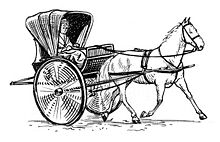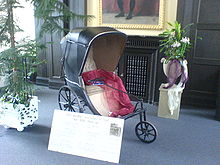- Chaise
-
A chaise, sometimes called chay or shay, is a light two - or four-wheeled traveling or pleasure carriage, with a folding hood or calash top for one or two people.[1]
The name came from the French for chair, through a transference from a sedan-chair to a wheeled vehicle. In the winter of 1791/92, in the opening phases of the French Revolution, Henrietta Ponsonby, Countess of Bessborough, noted the lack of ostentation in the streets of Paris, where a few drove themselves about in "little open chaises like the cabriolet but with one horse."[2] The two-wheeled version, usually of a chair-backed type, for one or two persons, also called a gig or one-horse shay, had a body hung on leather straps or thorough-braces and was usually drawn by one horse; a light chaise having two seats was a double chair .
The term chaise-cart was used for a light carriage fitted with suspension, used for transporting lightweight goods.[1]
The post-chaise was a fast carriage for traveling post in the 18th and early 19th centuries. It usually had a closed body on four wheels, sat two to four persons, and was drawn by two or four horses. The driver, especially when there was no coachman, rode postillion on the near horse of a pair or of one of the pairs attached to the post-chaise.
Another term for a chaise was chair, also called riding chair. A bath chair was a hooded and sometimes glassed wheeled chair used especially by invalids; it could be drawn by a horse or pushed by an attendant.
Other types of chaise included:
- calesín: small, one-horse, hooded, a seat behind for the driver, used in the Philippines
- curricle: two-wheeled, usually drawn by two horses
- shandrydan or shandradan: with a hood
References
The Casanova Tour - by Pablo Günther - Travelling Carriages - Casanova Magazine. Illustrations and text.is light four wheeler w/ open top
Categories:- Carriages
- Vehicle stubs
Wikimedia Foundation. 2010.


